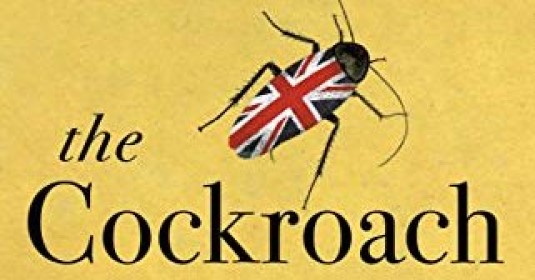
At the centre of the novel is a divisive national endeavour. Before taking over the PM's body, the previous Jim was indecisive and faced backbench rebellions, the contempt of the 1922 Committee, and the hostility of the right wing press. Rebooted with insectile fortitude the new Jim is fully and resolutely hell bent on seeing the project through. Brexit? No, something altogether more controversial. Reversalism.
This scheme is, effectively, backwards economics. You pay for the privilege of going to work, but conversely when you go shopping you're paid to take goods off the hands of retailers. The idea is this would eliminate poverty and unemployment and raise living standards, while the hoarding of money is punished by exorbitant negative interest rates and unspecified penalties for having more than £25 to your name. And this scheme enjoys the imprimatur of its very own referendum, and the backing of most of the right, the very obviously Donald Trumpian US president, and the "secret" reversalist leading the Labour Party. Opposing reversalism is the 'clockwise' establishment, who argue reversing the flow of economics would lead to ruin. This is all nonsense and talking down Britain, and as proof of its soundness the UK had already lined up a reversalist trade deal to prove its viability - with Nevis and Saint Kitts.
There are some shenanigans, a near-war with France, and tight votes in the House of Commons. But they get the vote over the line by pulling a dirty pairing trick, and reversalism passes into law. The cockroaches' jobs done, they relinquish their human bodies and, spoiler alert, head back to their Westminster home warm in the knowledge the disaster, misery, and poverty of the madcap scheme would be boom time for cockroaches.
In the past, a number of comrades (me among them) have described Ian McEwan as a Blairite novelist. Partly thanks to his 2005 novel, Saturday, which is set on the day of the gargantuan anti-Iraq War march, the protagonist spends much time agonising over the case for war versus the sombre moral rectitude of the marchers shuffling along London's streets. And then later he enjoys all the fun of a home invasion robbery. Since, McEwan hasn't strayed far from the polite spectrum of centrist opinion. He voted Liberal Democrat in 2010, indicated a preference for Ed Miliband in 2015, came out against the Israel boycott not long after, and made disparaging remarks about elderly leave voters a couple of years ago.
As amusing and fun this novel is, the whole absurdity of reversalism is its not-at-all-subtle satire of Brexit, and it is here McEwan falls into the Blairite comfort zone. Like most of the political developments of the last few years, reversalism is treated like an absurdity that fell from the sky. It was a nonsense doctrine that hoodwinked millions on the basis of fantastical promises. And enough of the gullible public lapped it up. It's redolent of how the remain movement have behaved these last three years, up to and including the outright dismissal of leave voters altogether by the LibDems. The utter bampottery of McEwan's reversalism is less comic effect and more the condensing of condescension and contempt he has for the Brexit enterprise. Brexit is indeed bullshit, but it didn't come out of nowhere.
And this is where the second Blairite theme comes in: a weary suspicion of the masses thinking and acting for themselves. It's up front in Saturday, but you get it too in his last book, Machines Like Us, which imagines the digital age and Corbynism (in the shape of Prime Minister Tony Benn) 30 years ahead of time. And here, the political class take the back seat and are forced to adapt themselves the the animal passions of the mob. Though the cockroach conspiracy at the novella's heart reiterates how easy it is for the mass to be manipulated by shadowy elites who can't wait to profit by their further misery. The implied lesson? Leave politics to the professionals.
The Cockroach is good fun, pacey, and funny. But more than any of this, it's a trip into the Blairite imaginary.
Caveat: I have not read this novel, and am going entirely on your review.
ReplyDelete"Reversalism" may be more than you think. By which I mean that it's not just some cockamamie fantasy, cooked up to serve as a more or less irrelevant Brexit-surrogate.
To me, it sounds very like a parody of the "trickle-up" economics practised by the Conservatives as of 2019. The poor pay proportionately more tax than the rich. Interest rates are effectively zero, so there's no incentive to save. Supermarkets constantly offload produce at ridiculous giveaway rates, but never alter the structural pricing imbalances that always hit the poorest in the pocket (50p for a pint of milk; 75p for two pints; £1 for four pints; £1.10 for six pints). Amazon pays HMRC less than a fraction of one percent of its UK profits, while local government has its budget slashed in half in the name of supposed revenue efficiencies.
Granted, what I am describing is a collection of loose and speculative parallels. I'm not claiming that Reversalism is an exact economic allegory, far from it - until I've read the novel, I couldn't make such a precise claim. But I honestly get the feeling that dismissing it all as just a nonsensical idea, serving more or less as a McGuffin, could perhaps be a bit of a critical oversight.
TL;DR - I think you may have thrown the baby out with the Brexity bathwater.
This sounds like a fascinating book. I'll get it on order from the library.
ReplyDelete